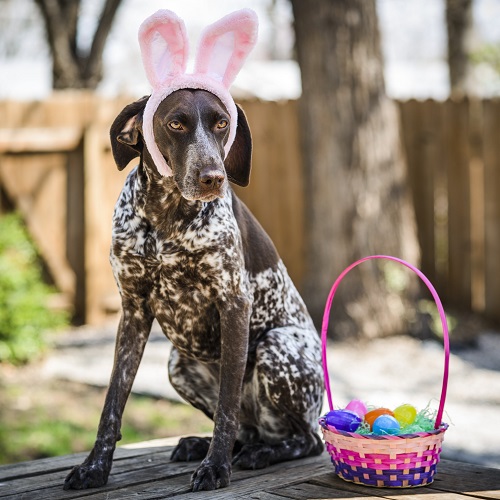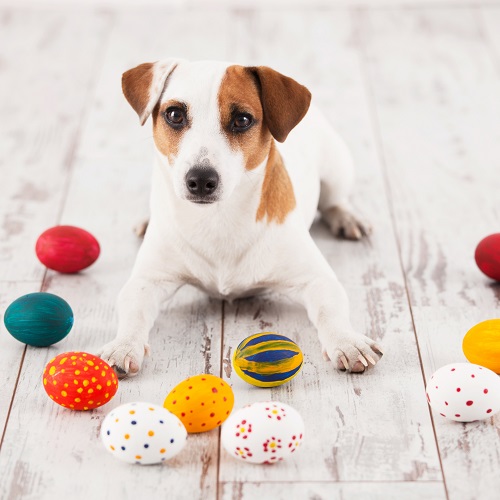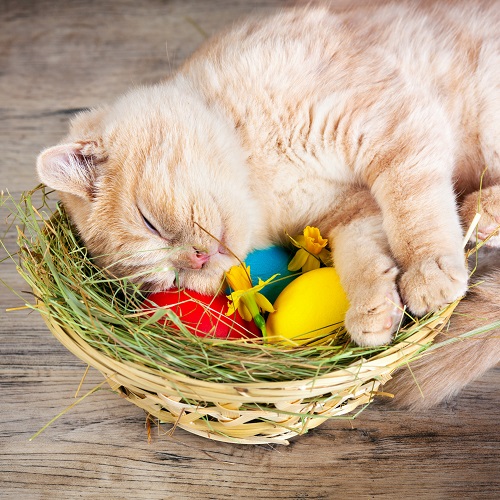Easter is a wonderful occasion to celebrate with family and friends. At the moment, we are more likely to be enjoying Easter goodies at home. For us Easter treats are a real indulgence, but for our canine and feline friends they can cause health problems. Some foods that are completely harmless to us are a real worry for our pets. It’s all to do with their digestive system and the way they metabolise and eliminate the foods. Your dog’s or cat’s body simply isn’t able to digest many human foods the same way as we can. So, it’s vitally important this Easter to make sure that you and your family are extra vigilant to make sure that any of those special treats (including chocolate bunnies and Easter eggs) are kept well away from your pets. Here are some tips to have a safe and enjoyable Easter at home.
Chocolate toxicity
We can’t emphasise enough just how dangerous chocolate is for animals, particularly for dogs. It can be any type of chocolate, but cooking chocolate and dark chocolate are the worst. Chocolate contains caffeine and the chemical compound theobromine, both of which are toxic to pets. The most dangerous of all is cooking chocolate (often used at Easter time for baking), it contains the highest level of theobromine. A general rule of thumb is the more bitter the chocolate, the more dangerous it is.
The reason that chocolate can be so lethal for dogs, is that their systems can’t break these elements down like humans can. Once the chocolate is eaten, the chemical can remain in an animal’s bloodstream for hours and build up to cause organ damage if not treated quickly and properly. For example, it only takes one gram of dark or baking chocolate per kilogram of your dog’s weight for the chocolate to reach toxic levels. Cats can also be affected, but tend to be more selective in what they wish to eat – hence chocolate toxicity is less commonly seen in cats.
The symptoms of chocolate toxicity will occur within four to 24 hours. It could be an upset stomach, vomiting, diarrhoea, excessive urinating, hyperactivity and heart irregularities. In severe cases this can be followed by depression, coma and seizures and some pets can die. Please keep a close eye on your pets. If your dog shows any of these symptoms, or if you even you think they’ve eaten some chocolate, take them to your vet for immediate attention. With prompt intervention, even if a large amount of chocolate has been ingested, the prognosis for your dog is a generally favourable one. A quick response can make all the difference. If your local Greencross Vets is closed over the holidays or if it is afterhours, our partner Animal Emergency Centres and Referral Hospitals are open 24/7 and are listed here.

No-nos for dogs
While chocolate is the danger treat this Easter, there are other foods and ingredients that you should be aware of. You might think that traditional hot cross buns should be ok, but they contain sultanas that can cause kidney problems and are harmful to pets. Lollies of all kinds are a real worry as well, they can contain xylitol which is an artificial sweetener that is very toxic to pets. Please don’t feed your pets any off-cuts or fatty leftovers, bones, garlic, onion or cooking dough – just to name a few. If you suspect your pet has eaten something they shouldn’t have, contact us for advice.
Instead of giving your pet ‘human foods’, why don’t you treat your furry friend with some delicious dog treats! check out our article about home-made dog treats and put your culinary skills to the test!

Care for your cats
You should also keep a close eye on your cat. They can be vulnerable to toxic foods and ingredients as well. Human medicines, lollies, onions and garlic as well as flowers such as lilies are all toxic. Just like dogs, cats are susceptible to adverse effects of alcohol. So please don’t leave any crème cocktails or rum infused fruit cake about. You can treat your cat with some delicious pet-friendly treats instead.
If you are concerned that your feline friend may have consumed chocolate, or any other ‘human-only’ foods, please give us a call. Remember, even if they aren’t showing any unusual symptoms, it’s best to be proactive if you think they have eaten something harmful. We are here to help, don’t hesitate to contact your nearest Greencross Vet for immediate treatment.

At Greencross Vets, nothing is more important than the health and wellbeing of your four-legged friend. If you have any more questions, please reach out to your local Greencross Vets. You can find your local Greencross Vets here. We’re more than happy to help!

 Greencross Vets
Greencross Vets 

